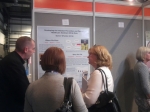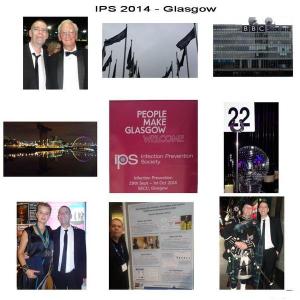 So, now I have had time to let my thoughts settle/ferment since I returned from IPS 2012 I can write a little update about how I got on, and try and give a flavour of just how inspiring the whole event was.
So, now I have had time to let my thoughts settle/ferment since I returned from IPS 2012 I can write a little update about how I got on, and try and give a flavour of just how inspiring the whole event was.

Yes, inspiring. Having thought long and hard, I think that is the best word to use as an overall theme. Having been through a difficult few months with the PhD with various set-backs, not to mention the episode of quarantine immediately prior to the conference, it is fair to say I was a somewhat jaded character on the train north to Liverpool. Not so on the train home! I was brimming with new ideas, running thoughts over in my head, and with a bag full of notebooks, hand-outs and, naturally, hand-gel samples….
So what inspired me? The answer is probably best split into 2 categories – my fellow delegates and the information presented.
Fellow Delegates
The former was a great comfort, and a timely reminder that Infection Control is an area where people are hugely motivated towards moving forwards, and that to do so they understand that team work, multi-disciplinary collaboration and mutual support are crucial elements for success. Having travelled to the conference alone it was a joy to meet with new people, to share stories, receive feedback on my work, and generally feel welcome in a room full of strangers. I was particularly made to feel welcome by some wonderful ladies from Bournemouth NHS Trust, Plymouth NHS Trust, St John’s Ambulance Head Office, and a Private healthcare provider in Sussex. It was also a perfect co-incidence to bump into one of my host ICT attending a fellow delegate – I was proud to see them there, knowing how hard they work helped me really relate the formal presentations to real-life, and it was great to debrief after a few of these sessions; relating them directly to ‘our’ NHS Acute trust. A perfect balance of theory, experience and practice.
Information Presented
The formal presentations then, to sum up, were varied yet all thought-provoking. Because of my focus on Hand Hygiene and Research I tended to attend sessions focused around these – although the session aimed at those new to Infection Control was a lovely way to start the Conference experience, really helped me feel less alienated as a ‘solo’ attendee. It felt like there was a great emphasis in all of the sessions (I attended) to encourage empowerment in the delegates, to encourage the belief that change was possible, and that it could come from anyone, regardless of position, background or experience. I found that inspiring, as often it can feel like only ‘top’ people can make a difference – both in the academic and medical sectors; I’ve heard this a lot from those I’ve met during my studies, as well as from within my academic circle. Great examples from Professor Judith Tanner helped illustrate how crucial research has often been born from the ideas of those on the ‘front-line’, continually perplexed or frustrated by a problem, and who took the step beyond fire-fighting to look for a more long-term solution.
Fire-fighting vs. long-term solutions
 This was such a key theme in my decision to undertake a PhD; I felt it deserved a quick mention. Having worked in the private sector for 6 years, I had a great team there which was focused on this very topic, looking for, and implementing, long-term solutions rather than continually reverting to emergency work-arounds to get through a deadline; and repeating this again and again. Doing a PhD allows an in-depth review of a particular issue or problem (for me, Hand Hygiene Auditing), using rigorous methodology, to produce a ‘unique contribution to knowledge’. In this way it is hoped that the field moves forwards, and that others can benefit from another building block; rather than continually being stuck in a loop of emergency ‘make-do’s’.
This was such a key theme in my decision to undertake a PhD; I felt it deserved a quick mention. Having worked in the private sector for 6 years, I had a great team there which was focused on this very topic, looking for, and implementing, long-term solutions rather than continually reverting to emergency work-arounds to get through a deadline; and repeating this again and again. Doing a PhD allows an in-depth review of a particular issue or problem (for me, Hand Hygiene Auditing), using rigorous methodology, to produce a ‘unique contribution to knowledge’. In this way it is hoped that the field moves forwards, and that others can benefit from another building block; rather than continually being stuck in a loop of emergency ‘make-do’s’.
What the IPS Conference did was remind me of this initial excitement, the fact that so many people are stuck doing ‘work arounds’, and yet through rigorous research there is the potential to improve the situation in Infection Control; and for me, Hand Hygiene Auditing.
Ending on a high
This idea, of being able to make a long-term difference, was firmly cemented during my final session at IPS – “Set me free – letting go of hand hygiene” presented by Julie Storr, (the new IPS President, WHO Consultant, Imperial College London) and Claire Kilpatrick (Consultant, World Health Oganisation Patient Safety).

An amazing presentation (you always know it’s going to a bit different, when the lights go down and Coldplay fills the speakers….), featuring an interview style debate on the future of Hand Hygiene. Too much to jot down here (and I’m sure there would be some rules about plagiarism….), but the 5 ‘things to take away’, as outlined by Claire, were summarised a bit like this:
Key points:
- Hand Hygiene should be part of the natural workflow, embedded in daily tasks
- Hand Hygiene interventions should be multipronged
- We should all look for ‘one key step for tomorrow’ to improve Hand Hygiene where we are
- Hand Hygiene is not that simple (but is should be….?)
- We need to understand the complexities (to get back to the simple side….)
An interesting point mentioned was that we may be living under an illusion of a ‘Perception of Success’; infection rates have gone down, we have been used to hearing about Hand Hygiene campaigns, we have seen an increase in AHR use, and AHR dispensers seem abundant – but have we really moved forwards in helping people understand why Hand Hygiene is important? Do we believe it is too simple? Jules had a great slide, demonstrating the journey from simple, through complex, back to simple – using a myriad of disciplines to navigate the complex stage; including psychology, neuroscience and ergonomics. Thus, we need to move away from the belief that “It’s easy, everyone can wash their hands’, through to understanding why and how we can enable Hand Hygiene at the right moments, to a point where it really is easy for people to act appropriately and perform Hand Hygiene correctly. Seriously, the slide explains this so much better….!

Finally, and of real interest to me, someone asked a question about the relevance of ‘Electronic Monitoring’ – a key theme of my research. A stand in the exhibition (see image, right) was causing great interest; having a badge system that had the ability to track (some) Healthcare worker Hand Hygiene compliance within a set zone – still in a prototype stage, but worthy of investigation. Issues such as price were definitely high on the agenda for delegates, and for me, issue relating to accuracy of data and, critically the relevance to the 5 Moments…. I was delighted to hear this was something that WHO was already taking active steps towards ensuring.
What I’ve taken away, and what next….
Now my thoughts have settled, and I have almost finished deciphering my handwritten scrawl, I think my main output from the Conference is twofold.
Firstly, I am confident that the work I have been doing is worthwhile, that Hand Hygiene is still a crucial nut yet to be ‘cracked’ fully, and that the methods to complete this process is still hotly debated.
Secondly, though, I am confused, verging on worried. Where do I go from here? I was really intrigued by the presentation by Julie and Claire, the concept of Simple/Complex/Simple, the involvement of Neuroscience, Psychology and Ergonomics (to name but a few elements), and the emerging field of electronic monitoring – but I feel I need further guidance as to where to apply my energies next. My PhD is very ‘open’ at the moment, I feel it could still go in a number of directions, which is exciting, yet I need to start pulling it down, ready to write up into one cohesive ‘story’. But I do not want it to be the only story. It doesn’t end at submission…! So, I am now off to IFIC 2012 (Twelfth Congress of the International Federation of Infection Control) and what I’d really like to come away with is a clearer idea of how I could plan my Post-Doc future….. Time will tell…..

Read Full Post »
 After a busy few weeks of holiday followed by personal quarantine, I thought it was time I put pen to paper and shared some of the thoughts I’ve been having whilst reflecting upon my time at Infection Prevention 2014…(#IP2014).
After a busy few weeks of holiday followed by personal quarantine, I thought it was time I put pen to paper and shared some of the thoughts I’ve been having whilst reflecting upon my time at Infection Prevention 2014…(#IP2014).

























